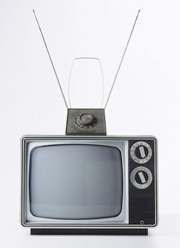Television: Difference between revisions
Jump to navigation
Jump to search
imported>Yi Zhe Wu (→Broadcasting development: template) |
imported>Russell Potter (section commented out; see Talk page) |
||
| Line 5: | Line 5: | ||
"Television" literally means "far sight". The word was formed by combining the Greek word ''{{polytonic|τῆλε}}'' ("tele", or "far") with the Latin word ''visio-n'' ("sight", from ''video, vis-'' to see) — this coinage follows the pattern of [[telegraph]] ("far writer") and [[telephone]] ("far talker"). In general usage, the meaning of "television" has been expanded to also refer to receivers, and to both the video broadcasting industry and its programming. | "Television" literally means "far sight". The word was formed by combining the Greek word ''{{polytonic|τῆλε}}'' ("tele", or "far") with the Latin word ''visio-n'' ("sight", from ''video, vis-'' to see) — this coinage follows the pattern of [[telegraph]] ("far writer") and [[telephone]] ("far talker"). In general usage, the meaning of "television" has been expanded to also refer to receivers, and to both the video broadcasting industry and its programming. | ||
[[Category:CZ Live]] | [[Category:CZ Live]] | ||
[[Category:Media Workgroup]] | [[Category:Media Workgroup]] | ||
[[Category:Engineering Workgroup]] | [[Category:Engineering Workgroup]] | ||
Revision as of 07:33, 19 June 2007
Television (also, informally, "TV" and "telly") is the electronic transmission of moving pictures. Most television signals also include synchronized sound, an exception being surveillance cameras, which usually have no audio.
"Television" literally means "far sight". The word was formed by combining the Greek word τῆλε ("tele", or "far") with the Latin word visio-n ("sight", from video, vis- to see) — this coinage follows the pattern of telegraph ("far writer") and telephone ("far talker"). In general usage, the meaning of "television" has been expanded to also refer to receivers, and to both the video broadcasting industry and its programming.
